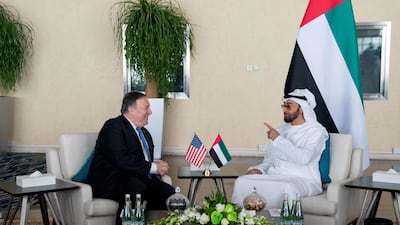As a momentous year draws to a close, The National is running a series of articles examining the effect of the growing diplomatic strength of the UAE.
Over the next few days, we will examine the country’s growing international influence, be it through the soft power of culture and connectivity, or strengthening ties within the GCC and further around the globe.
This nation has never had a more prominent position in the world – and this series will explain how it was achieved, why it matters and what lies ahead.
The US has shown the importance it places on its relationship with the UAE in the last few months.
Secretary of Defence James Mattis, National Security Adviser John Bolton and US special envoys on Iran and Afghanistan, Brian Hook and Zalmay Khalilzad, visited the UAE for discussions on Iran, Yemen, Syria and Afghanistan.
The visits and growing co-operation in trade and security highlight the depth and complexity of the relationship between the two countries, experts say.
Barbara Leaf, who retired as US ambassador to the UAE this year, said the visits were “testimony to the importance this administration places on the relationship, and the continuing importance of the UAE as a diplomatic partner not just in issues related to the Middle East but beyond”.
Ms Leaf, now a senior fellow at the Washington Institute for Near East Policy, said the UAE’s ability to forge relations with world powers gave it great influence.
“It is the degree to which the UAE cultivates strategic relationships with great regional and global powers that, among other factors, has given it outsize weight diplomatically and economically, in reaching out to India, Pakistan, Afghanistan and the Horn of Africa,” she said.
The growth of ties between the US and UAE has not been without obstacles.
_______________
Read more:
Editorial: Trump's withdrawal from the Middle East offers new opportunities
UAE backs Saudi rejection of US Senate vote on Yemen
Taliban meet US officials in UAE over Afghan peace effort
________________
“The Qatar dispute and increasingly Yemen are considerable challenges for the US-UAE relationship,” Ms Leaf said.
With the US Senate voting to block America’s role in Yemen, there has been increased pressure from Washington to end the conflict.
Saudi Arabia, the UAE, Bahrain and Egypt cut ties with Qatar over its support for terrorism, but Ms Leaf said the US was concerned that this was distracting the region from the fight against extremism and Iran’s interference.
But she personally does not see these differences as something out of the ordinary.
“Sovereign countries even when they’re close have their independent views and quite often disagree,” Ms Leaf said.
Washington is also keeping an eye on the growing relationship between the UAE and China.
After the state visit by Chinese President Xi Jinping in the summer, and with bilateral trade expected to rise to $58 billion (Dh213bn) this year, US officials are speaking more publicly about Beijing’s rising influence in the Middle East.
Ms Leaf said that during her four years as ambassador in Abu Dhabi, “we could see a rising dimension to the commercial relationship between UAE and China” but warned that the real concern would be the "increasing military-defence dimension” of the relationship.
The Donald Trump administration nominated John Rakolta, a business executive, to be the next ambassador to the UAE. His appointment is awaiting Senate confirmation.
Undersecretary of State David Hale warned in a recent speech at the Middle East Institute that China wanted to "expand its influence in the region through investment, trade and infrastructure deals”.
“As we have seen elsewhere, Chinese trade and investment comes with strings and it can produce a debt trap to create long-term dependencies,” Mr Hale said.
But analysts who follow security relations between the US and the UAE described the two countries' links as being unshakable.
Nicholas Heras, a senior fellow at the Centre for a New American Security think tank, described the UAE as “one of the most important security partners for the US in the greater Middle East region”.
These ties are underpinned by the Emirates’ ability to project power across the region at a time when “US defence policy is moving in the direction of a smaller American military presence in the Middle East, and a larger reliance on capable regional partners to conduct their own operations with limited US support”, Mr Heras said.
“The UAE is by far the only regional security partner that can conduct its own operations and has the ability to work in joint operations with the US military.”
He said this was shown in Yemen, where the US has carried out joint operations with the UAE against Al Qaeda in the Arabian Peninsula. This operation helped to recapture Mukalla and other areas in Hadramawt province, and in Shabwa and Abyan provinces.
Then there was the war in Afghanistan. Abu Dhabi hosted peace talks attended by Mr Khalilzad, and representatives from the Taliban, Pakistan, Saudi Arabia and the Afghan government.
Kamran Bokhari, a national security and foreign policy specialist with the University of Ottawa, said the UAE’s influence in Afghanistan came from the war's regional and internal dynamics.
Mr Bokhari said the UAE could help Washington’s attempts to pressure Pakistan as the US tried to end the longest-running war in American history.
The growing scope and complexity of US-UAE relations could bring increased diplomatic traffic and security co-ordination between the two, as Washington tries to reshuffle its priorities and presence in the Middle East while Abu Dhabi expands its role and influence.

